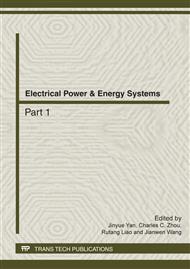p.1469
p.1477
p.1481
p.1485
p.1490
p.1496
p.1503
p.1508
p.1512
Long Term Forecast of Electric Load in Beijing
Abstract:
Accurate forecast of electric load provides scientific grounds for national departments to plan how to produce electric power or how to use it and it also benefits the maintenance and construction plan of power grid to improve power supply security. Now the demand of electric power in Beijing increases yearly due to sustained economic development, the electric-load-forecast is practical for Beijing to prepare future development of its electric power. This paper selected 1973~2008 data of Beijing to test the causality between economy and electric load. Then it established equation based on cointegration theory to forecast electric load in future years.
Info:
Periodical:
Pages:
1490-1495
Citation:
Online since:
May 2012
Authors:
Keywords:
Price:
Сopyright:
© 2012 Trans Tech Publications Ltd. All Rights Reserved
Share:
Citation:


